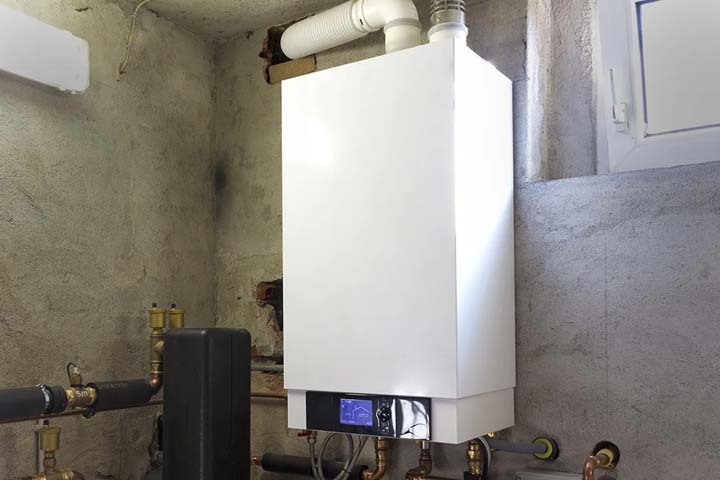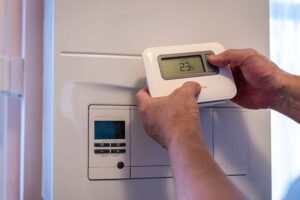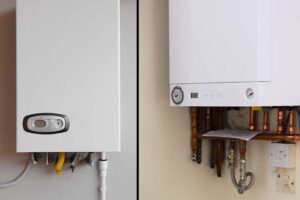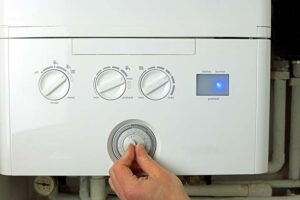A boiler must have a heat exchanger very essential. It helps heat from the gas fire to the cold water go from one to another. Heat exchange is similar to back bone in a boiler because it facilitates heating water much more efficiently than other new heating systems.
Without a heat exchanger, the boiler may not be able to produce hot water or heat. It is constructed of a strong metal, such as stainless steel or aluminum heat exchanger. These components increase boiler lifespan and help the heat to migrate more effectively.
How Does a Heat Exchanger Work?
A heat exchanger works in that it transfers heat from the burning process to the water. Burning gasoline on the stove produces hot gasses.
These gases pass over the heat exchanger surface of the boiler. The boiler’s heat exchanger transfers heat from the gas which is being burnt to cold water.
This hot water circulates through the heating system to radiators or to taps. Two heat exchangers on a combi boiler there normally are: one plate heat exchanger secondary and a main heat exchanger. This structure saves energy and facilitates the simpler heat movement.
Types of Heat Exchangers in Boilers
Every kind of heat exchanger used in a boiler differs. The most commonly employed types are plate heat exchangers, shell and tube, and aluminum.
Due to their very thin metal plates, which are stacked one on top of the other, plate heat exchangers are also best for heat exchange.
Via tubes within a metal shell, waste gas heat in the shell and tube heat exchanges reaches the water.
Two heat exchangers—a primary and a secondary plate heat exchanger—make up a combi boiler. The type of heat exchanger used in a boiler decides how quickly and efficiently heat transfers through it.
Why is a Heat Exchanger Important?
A heat exchanger is critically important for boiler operation. It ensures quick and efficient heating and hot water. Should your boiler’s heat exchanger break, you will pay more and have less warmth. The product and efficiency of the heat exchanger stove determine its pricing.
Your boiler will be more reliable and efficient if you keep it well-maintaining. Should you see any indication of boiler heat exchanger malfunction—such as leaks or inadequate heating—a gas safe engineer should check it.
Materials Used in Heat Exchangers
Heat exchanges are produced from many kinds of materials. The stainless steel heat exchangers endure longer as they are robust and rust-free. Additionally light and effectively transferable are the aluminum heat exchangers.
Since the copper heat exchangers move heat really quickly, they are rather effective. The efficiency and lifetime of a heat exchanger depend on its production technique and materials. Choosing a boiler with a robust heat exchanger will save running costs and provide better heating.
Signs of a Failing Heat Exchanger
One might have many problems with a damaged heat exchanger. The heating may not be sufficient in efficiency.
Should it take more time to get the water heated, the exchanger may have broken down. Unusual sounds from your heater can point to a problem.
Should the exchanger leak or burst, dangerous gases might escape and compromise operating safety. Scaling makes all this less effective since hard water accumulates.
Should a boiler heat exchanger prove to be defective, you may have to have it fixed to guarantee effective and safe operation.
How to Maintain a Heat Exchanger?
Periodically maintained heat exchanger boiler faults help to prevent them. By cleaning the exchanger, one eliminates the dirt and dust interfering with heat flow. With regular boiler repairs, the heat exchanger is in excellent shape.
Running the gadget with pure water does not create scale. If the heat exchanger is leaking or cracked, it must be replaced. Maintaining your boiler ensures that it will work longer and better.
Replacing a Heat Exchanger
Occasionally, one has to replace a faulty heat exchanger. The type of boiler and the material affect how much it will cost to replace the heat exchanger. Replacing a heat exchanger on a Worcester Bosch boiler may cost differently than replacing one on a Vaillant boiler.
To ensure it is done correctly, a heat exchanger should be replaced by a gas safe engineer. You may require a new boiler rather than a new heat exchanger if your boiler is old.
Heat Exchanger Efficiency and Energy Savings
Well maintained heat exchangers help a boiler run more effectively. This guarantees efficient and fast movement of heat.
Heating water this way uses less fuel. In a condenser boiler, an effective heat exchanger enables the heat from waste gases to be used once again, therefore improving the system efficiency.
Less helpful a boiler that does not condensate is as it loses more heat. Frequent cleaning and inspections help things run better and more effectively, hence reducing energy use.
Common Problems with Heat Exchangers
The heat exchanger heater could start to malfunction over time. Rust may result from hard water. Heat moves slower in scale and mineral growth environments. Heat and high pressure may induce leaks and fissures.
These types of issues compromise the boiler’s efficiency and performance. Maintaining excellent form of the heat exchanger and replacing it when it breaks helps one to prevent expensive repairs.
Difference Between Primary and Secondary Heat Exchangers
Combi boilers often have two heat exchangers. The primary heat exchanger transports heat straight from the burning process to the water. Reusing heat from flue gases, the secondary heat exchanger increases efficiency.
In a combi boiler, heat exchangers provide fast provision of both heating and hot water. This arrangement increases performance while cutting energy waste. Knowing these components helps one choose the finest boiler.
Choosing a Boiler with a Good Heat Exchanger
Consider the quality of the heat exchanger upon heater purchase. A good heat exchanger last longer and performs better. Many prefer heat exchangers composed of stainless steel or aluminum. Seek for a boiler with decent economy ratings.
A well-performing gas stove with a heat exchanger runs on less fuel. Consult reviews from other consumers to choose reliable models. Buying a heat exchanger from a good manufacturer in a Worcester boiler will provide better performance and fewer repairs needed.
Conclusion
A boiler depends critically on a heat exchanger. It produces hot water and heating by transferring heat from burning gas to cold water. Maintaining cleanliness of the exchanger enhances performance. Selecting a boiler with a premium exchanger saves expenses and energy.
Regular servicing improves the life of the boiler and prevents heat exchanger issues. You may need a new heat exchanger or a new boiler if your boiler is old or has recurring heat exchanger faults. Knowing how a heat exchanger works helps in making better heating choices.
Frequently Asked Questions
Typical signs include low heating, unusual sounds, leaks, and regular boiler shut-down. A gas safe engineer should look into the problem right away.
The cost varies on the boiler type and brand. Changing a heat exchanger in a boiler Worcester Bosch might set you back £300–£600.
While minor problems like scale development may be fixed, cracks or corrosion often call for replacing the heat exchanger for safe running.
Maintaining the heat exchanger via an annual boiler service guarantees effective heat transmission and helps to avoid damage.







